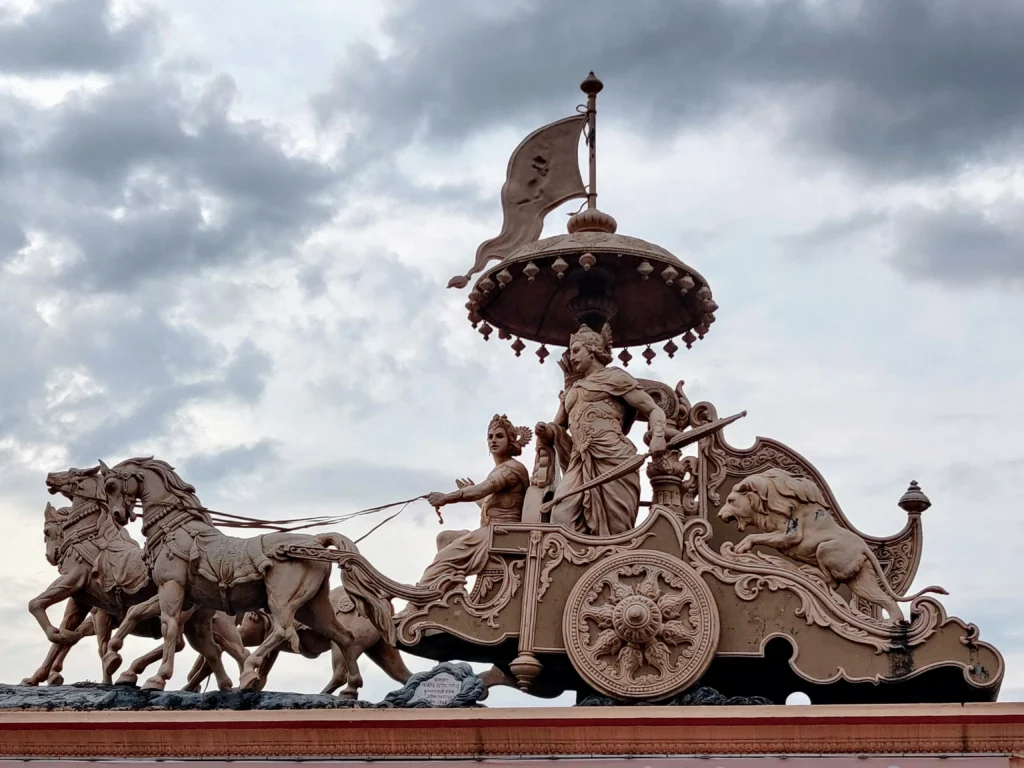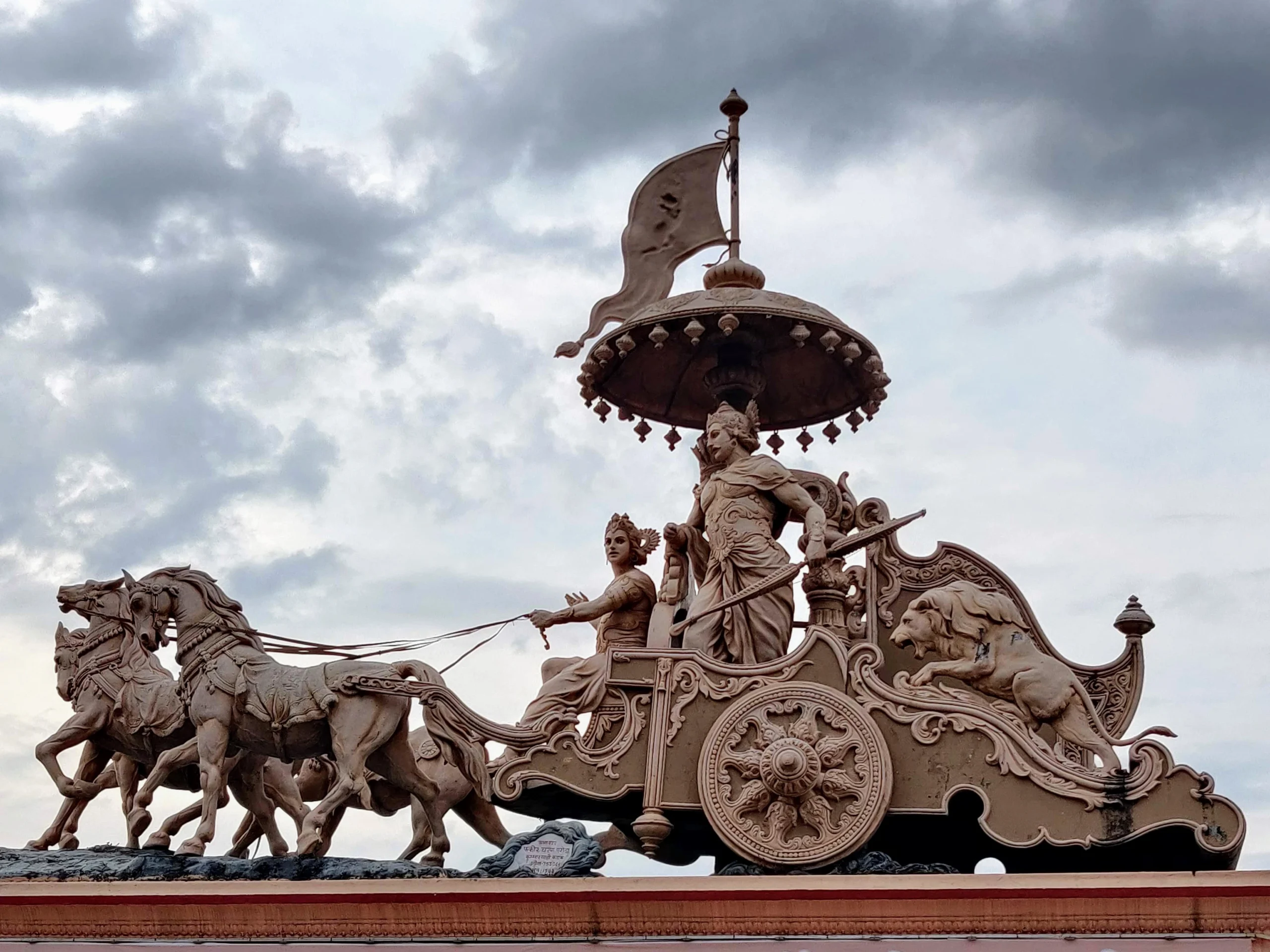Introduction:
The Bhagavad Gita’s Lessons for Making People’s Lives Better: The Bhagavad Gita is one of the most revered and influential texts in the Hindu tradition. It is a dialogue between Lord Krishna and Arjuna, and it offers insights into how to live a fulfilling and meaningful life. One of the Gita’s main themes is the importance of taking actions that benefit others and making the world a better place. In this blog post, we will explore some of the Gita’s teachings on how we can make people’s lives better.

Photo by Anshuman Abhishek on Unsplash
Practice Selflessness:
The Gita emphasizes the importance of selflessness and putting others’ needs before our own. It teaches us that we should perform our actions without attachment to the results, and our focus should be on the well-being of others. By acting selflessly, we can make a positive impact on the lives of those around us and contribute to the greater good.
Cultivate Compassion:
Compassion is another key teaching of the Gita. It teaches us to see everyone as part of the same divine essence and to treat them with love and kindness. By cultivating compassion, we can create a more harmonious and peaceful world, where everyone feels valued and supported.
Practice Mindfulness:
The Gita teaches us to be present in the moment and to focus our minds on what we are doing. By practicing mindfulness, we can improve our ability to connect with others and respond to their needs. This can help us to build deeper and more meaningful relationships, which can have a positive impact on people’s lives.
Serve Others:
Service to others is a fundamental principle of the Gita. It teaches us to use our skills and resources to help those in need, and to contribute to society in a meaningful way. By serving others, we can make a tangible difference in people’s lives and help them to overcome their challenges and difficulties.
Sloka 2.63:
“Tasmat sarvesu kalesu
mam anusmara yudhya ca
mayy arpita-mano-buddhir
mam evaisyasy asamsayah”
Meaning: “Thus, constantly remembering Me and fighting, your mind and intelligence will be fixed on Me alone. There is no doubt about it.”
This sloka teaches us the importance of focusing our minds on God and performing our actions in His service. By doing so, we can achieve a state of mental and spiritual purity, which will allow us to live a fulfilling and meaningful life.
Sloka 2.14:
“Matra-sparsas tu kaunteya
sitosna-sukha-duhkha-dah
agamapayino ‘nityas
tams titiksasva bharata”
Meaning: “O son of Kunti, the non-permanent appearance of happiness and distress, and their disappearance in due course, are like the appearance and disappearance of winter and summer seasons. They arise from sense perception, O scion of Bharata, and one must learn to tolerate them without being disturbed.”
This sloka teaches us the importance of accepting the temporary nature of happiness and distress in life. We should not become attached to either, as they are both fleeting and will inevitably come and go. Instead, we should cultivate a sense of detachment and learn to tolerate life’s ups and downs without becoming disturbed.
Sloka 3.27:
“Prakrteh kriyamanani
gunaih karmani sarvasah
ahankara-vimudhatma
kartaham iti manyate”
Meaning: “The spirit soul bewildered by the influence of false ego thinks himself the doer of activities that are in actuality carried out by the three modes of material nature.”
This sloka teaches us that our true identity is not the body but the soul. We should not become attached to our material accomplishments, as they are ultimately temporary and illusory. Instead, we should strive to connect with our spiritual essence and act in accordance with our higher nature.
Sloka 6.5:
“Uddhared atmanatmanam
natmanam avasadayet
atmaiva hy atmano bandhur
atmaiva ripur atmanah”
Meaning: “Let a man raise himself by his own efforts. Let him not degrade himself. The self alone is the friend of the self, and the self alone is the enemy of the self.”
This sloka teaches us the importance of self-discipline and self-motivation. We are ultimately responsible for our own success and happiness, and we should strive to uplift ourselves through our own efforts. At the same time, we should be mindful of our own negative tendencies and work to overcome them.
Sloka 9.34:
“Manmana bhava mad-bhakto
mad-yaji mam namaskuru
mam evaisyasi satyam te
pratijane priyo ‘si me”
Meaning: “Engage your mind always in thinking of Me, become My devotee, offer obeisances to Me, and worship Me. Being completely absorbed in Me, surely you will come to Me.”
This sloka teaches us the importance of developing a personal relationship with God. By dedicating ourselves to His service and cultivating a sense of devotion, we can connect with the divine and experience a sense of inner peace and fulfillment.
Conclusion:
In summary, the Bhagavad Gita provides a wealth of guidance on how we can make people’s lives better. By practicing selflessness, cultivating compassion, practicing mindfulness, and serving others, we can create a more harmonious and peaceful world, where everyone feels valued and supported. These teachings are relevant to people of all backgrounds and beliefs, and they offer a path to living a fulfilling and meaningful life. Let us take these teachings to heart and work towards making the world a better place, one action at a time.


